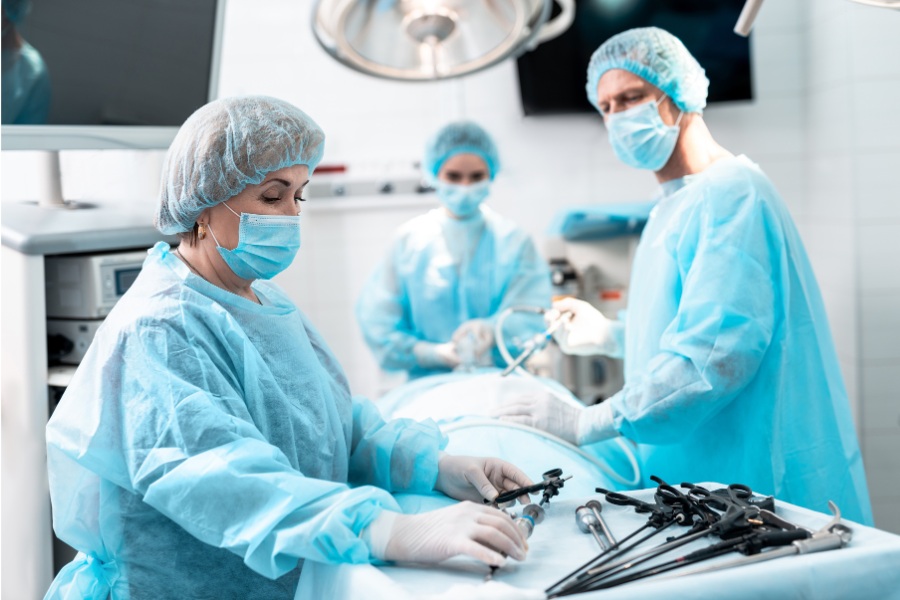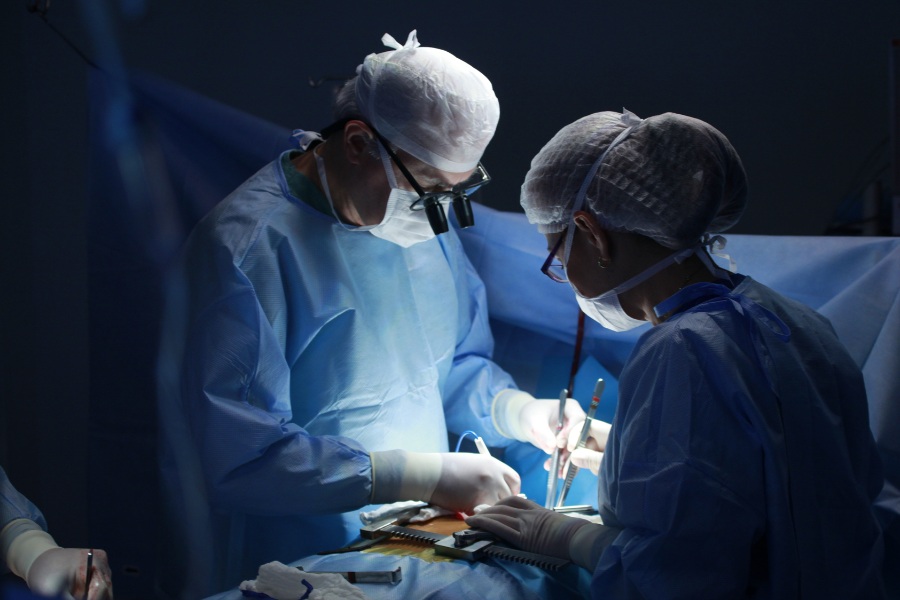Perioperative nurses perform operative or other invasive work for patients. These nurses can choose between two types of operating room environments: the traditional hospital setting or an ambulatory surgery center (ASC).
Ambulatory surgery centers are health care facilities that provide outpatient procedures. This includes same-day surgical care, as well as diagnostic and preventative procedures. Although there is an obvious difference between ASCs and hospitals, there are a surprising number of similarities, too.
One of the greatest similarities is that the type of surgical procedures performed is the same in both. In fact, physicians developed ambulatory surgery centers as a better way of booking surgical procedures. Physicians experienced a variety of obstacles to surgical procedures in hospitals, such as:
- Hospital operating rooms often have limited availability.
- There are scheduling delays.
- Due to budgets and strict policies, it may be difficult to get new equipment.
Physicians were very involved with the creation of ASCs, and they continue to be involved. About 90 percent of all surgery centers are partly owned by physicians.
Over time, hospitals have recognized the value of surgery centers. In fact, many ASCs are jointly owned by local hospitals. Hospitals have ownership interest in 23 percent of all ASCs, and two percent are owned entirely by hospitals.
All About ASC Nursing
IN THIS ARTICLE

Ambulatory Surgery Centers (ASCs) play a vital role in modern healthcare by providing outpatient surgical services.
These centers focus on delivering efficient, same-day procedures that enhance patient convenience. Understanding their rise, regulatory framework, and differences from hospital-based surgeries is key for those involved in healthcare.
Rise of ASC Nurses
The popularity of Ambulatory Surgery Centers has increased significantly over the past few decades.
ASCs offer a cost-effective alternative to traditional hospital surgeries. Many patients prefer ASCs due to shorter wait times and the ability to return home on the same day.
ASCs can handle a variety of procedures, including orthopedic, gastrointestinal, and ophthalmological surgeries.
This expansion reflects a shift towards outpatient care, aligning with patient preferences for convenience and rapid recovery. According to industry data, patient satisfaction ratings for ASCs are often higher than those for hospitals.
ASC Certification and Regulations
Certification of ASCs is crucial for ensuring quality and patient safety. The Centers for Medicare & Medicaid Services (CMS) set standards that ASCs must meet to receive reimbursement for services.
These regulations cover facility design, staff qualifications, and patient care protocols.
To operate, ASCs must pass a certification exam that assesses their adherence to these standards. Compliance with regulatory bodies not only impacts funding but also enhances the center’s reputation.
Accreditation from the Accreditation Association for Ambulatory Health Care (AAAHC) or The Joint Commission can further elevate an ASC’s credibility.
Ambulatory Surgery Center Vs. Hospital-based Surgeries
There are key differences between ASCs and hospital-based surgeries. ASCs primarily focus on outpatient procedures, while hospitals can manage more complex cases requiring overnight stays.
ASCs typically have lower operational costs, which can translate to lower fees for patients. This cost-effectiveness often appeals to those with high-deductible insurance plans. In contrast, hospitals are equipped for a broader range of services, from emergency care to intensive treatments.
Patients often report less anxiety and higher satisfaction in ASCs due to the more streamlined processes and one-on-one care. These elements contribute to a growing preference for outpatient surgery among many individuals.
Types of Surgery That Take Place

Last year, there were 21, 626,850 surgical procedures within the United States, with 53.1% of these surgeries being performed in ASCs. The following procedures were among the most common ambulatory surgeries:4
- Lens and cataract procedures (99.9 % performed in ambulatory settings)
- Cholecystectomy/common duct exploration (55.1 % ASC)
- Excision of semilunar cartilage of knee (98.5 % ASC)
- Hernia repair (90.2 % ASC)
- Lumpectomy (96.5 % ASC)
- Decompression peripheral nerve (95.2 % ASC)
- Transurethral excision; drainage; or removal urinary obstruction (71.9 % ASC)
- Pacemaker/cardioverter (64.0 % ASC)
- Skin graft (67.0 % ASC)
- Hysterectomy (39.8 % ASC)
- Laminectomy/excision intervertebral disc (26.1 % ASC)
Overall, the following therapeutic areas have the most prevalent volume of surgeries that are performed in ASCs:5
Note: NurseRegistry also offers post-surgery nursing care opportunities.
Therapeutic Class % of all ASC Nursing Procedures
Gastroenterology 31%
Ophthalmology 28%
Pain Management 22%
Orthopedics 8%
Other 7%
Dermatology 4%
Nursing Care in Ambulatory Surgery
Nursing care in ambulatory surgery centers is vital for ensuring patient safety and successful outcomes.
Perioperative nurses play key roles in every stage of the surgical process, from patient selection to postanesthesia care. They monitor patients closely, provide education, and ensure efficient care delivery.
Role of Perioperative Nurses
Perioperative nurses are essential to the surgical team. They work before, during, and after surgical procedures to provide comprehensive patient care. These nurses assess patients, prepare them for surgery, and address any questions or concerns.
During the procedure, they assist the surgical team by managing instruments and maintaining a sterile environment. After surgery, they evaluate patients’ conditions and prepare them for recovery.
Their expertise helps to prevent complications and supports overall patient well-being.
Patient Selection and Preoperative Care
Patient selection is a critical aspect of ambulatory surgery. The nursing team evaluates patients to determine their suitability for outpatient procedures. This involves reviewing medical history, current medications, and any comorbidities.
Preoperative care includes patient education, which is important for reducing anxiety and ensuring cooperation. Perioperative registered nurses explain the surgical process, discuss anesthesia options, and outline post-surgery care. They also ensure that patients understand preoperative instructions, such as fasting guidelines and medication adjustments.
Nursing Responsibilities in Intraoperative Care
During surgery, the nursing staff takes on multiple responsibilities. They closely monitor patients’ vital signs and anesthesia levels, ensuring safety throughout the procedure. Their role is pivotal in responding to any changes in the patient’s condition.
Intraoperative nurses maintain a sterile field, manage surgical instruments, and assist the surgeon as needed. They also communicate effectively with other team members to coordinate care.
By staying alert and focused, they significantly contribute to a smooth surgical experience.
Postanesthesia and Recovery in ASC
After surgery, patients are moved to the postanesthesia care unit (PACU) for recovery. Nursing staff monitor vital signs and assess patients for any adverse reactions to anesthesia. Their primary goal is to ensure that patients regain consciousness safely and comfortably.
The nursing team provides pain management and addresses any immediate post-operative needs. They also educate patients on recovery guidelines and what to expect in the following days. Effective postanesthesia care is vital in preventing complications and ensuring a safe transition home.
Advantages of using Ambulatory Surgery Center

Typically, ASCs make pricing information available to their patients in advance of surgery. The industry is eager to make price transparency a reality, not only for Medicare beneficiaries, but for all patients.
To offer maximum benefit to the consumer, these disclosures should outline the total price of the planned surgical procedure and the specific portion for which the patient would be responsible. This will empower health care consumers as they evaluate and compare costs for the same service amongst various health care providers.
The ASC health care delivery model enhances patient care by allowing physicians to:
- Focus exclusively on a small number of processes in a single setting, rather than having to rely on a hospital setting that has large-scale demands for space, resources and the attention of management
- Intensify quality control processes since ASCs are focused on a smaller space and a small number of operating rooms
- Allow patients the ability to bring concerns directly to the physician operator, who has direct knowledge about each patient’s case, rather than deal with hospital administrators, who almost never have detailed knowledge about individual patients or their experiences
Physician ownership also helps reduce frustrating wait-times for patients and allows for maximum specialization and patient–doctor interaction. Unlike large-scale institutions, ASCs:
- Provide responsive, non-bureaucratic environments tailored to each individual patient’s needs
- Exercise better control over scheduling, so virtually no procedures are delayed or rescheduled due to the kinds of institutional demands that often occur in hospitals such as unforeseen emergency room demands
- Allow physicians to personally guide innovative strategies for governance, leadership and most importantly, quality improvement
As a result, patients say they have a 92% satisfaction rate with both the care and service they receive from ASCs. Safe and high quality service, ease of scheduling, greater personal attention and lower costs are among the main reasons cited for the growing popularity of ASCs.6
The Role of the Nurse in the Ambulatory Surgical Setting
The same-day surgery nurse is a specialized ambulatory care nurse, defined as a nurse who provides episodic care to patients for 24 hours or less in many different settings.
The same-day surgery nurse cares for patients before and after same-day surgery and some patients undergoing outpatient procedures.
Ambulatory care and same-day surgery nurses use cost-effective ways to assist patients in promoting health, preventing disease, and managing chronic or acute health problems. The same-day surgery nurse also promotes self-management and assists family members or friends in caring for their loved ones.
The same-day surgery unit is used not only for surgical patients but also for many medical patients. Patients requiring many kinds of I.V. therapy and blood transfusions and those scheduled for radiographic interventional procedures are brought to the unit. Patients recovering from upper endoscopies and colonoscopies spend time here.
Patients having pain control procedures such as epidural steroid injections or trigger point injections recover here. Some SDS units also care for pediatric patients having outpatient surgery.
Patients may be admitted through this unit for all major elective surgery. The American Nurses Credentialing Center (ANCC), which is part of the American Nurses Association (ANA), has a specialty certification for Ambulatory Care Nursing.
The credential awarded is Registered Nurse-Board Certified (RN-BC). This certification is renewable every 5 years. You may also choose to maintain relevant certifications and join national, state, and specialized nursing associations.7
Requirements to be a Nurse in the Ambulatory Surgery Center Setting
Because the same-day surgery unit has a rapid turnover of patients, every day is different. Nurses on this unit must have the ability to adapt to changing situations. They also need to have good assessment skills along with some case management knowledge when caring for short-term patients.
The education required to work in a same-day surgery unit may include a telemetry course and basic life support, advanced cardiac life support (ACLS), and pediatric advanced life support (PALS). Ambulatory care certification may be required, but even if it’s not, having it will give you a better chance of landing a job at this unit.
Inquire at your hospital’s same-day surgery staff development department to learn the qualifications for joining this team.8
Start Your Nursing Journey Today
If you have interest in being an ASC Nurse, NurseRegistry can help.
We offer per diem nursing opportunities to nurses. This includes opportunities to work in highly regarded surgery centers. With NurseRegistry, you can benefit from:
- Creating your own schedule
- Setting your own rates
- Picking your job placements
- A dedicated and personable support team
Click below to discover more ways that NurseRegistry could supplement your nursing career today.
People Also Ask about ASC Nursing
This section addresses common inquiries about nursing roles in ambulatory surgery centers. It covers responsibilities, salary comparisons, typical job duties, required training, guidelines, and examination questions relevant to nurses in this specialty.
What are the primary responsibilities of a nurse in an ambulatory care setting?
Nurses in ambulatory care are responsible for patient assessments, administering medications, and preparing patients for surgery. They also provide education about procedures, assist during surgeries, and ensure proper post-operative care. Their focus is on patient safety and effective communication throughout the surgical process.
How does the salary of an ambulatory care nurse compare to other nursing specialties?
The salary of an ambulatory care nurse can vary based on location, experience, and specific duties. Generally, their earnings may be comparable to other nursing specialties, but sometimes they may earn slightly less than those in high-demand fields, like intensive care or emergency nursing.
Can you describe the typical job duties of a nurse working in an ambulatory surgery center?
In an ambulatory surgery center, a nurse typically conducts preoperative assessments, monitors patients during procedures, and provides postoperative care instructions. They also maintain records, collaborate with surgical teams, and ensure a safe environment for patients throughout their surgical journey.
What specific training or certifications are required for nurses in ambulatory surgery infection control?
Nurses focusing on infection control in ambulatory surgery centers should have training in infection prevention practices. Certifications such as the Certified Nurse Ambulatory (CNAMB) can enhance their knowledge and skills in this area, helping ensure compliance with health regulations and best practices.
What are the guidelines for ambulatory surgery according to the Association of periOperative Registered Nurses (AORN)?
The AORN provides guidelines that emphasize patient safety, effective communication, and proper surgical protocols. These guidelines cover areas such as preoperative preparation, infection prevention, and patient discharge processes to ensure high-quality care in ambulatory surgery settings.
What are some common questions included in the Certified Nurse Ambulatory (CNAMB) examination?
The CNAMB examination includes questions on patient care, preoperative and postoperative processes, and infection control measures. It tests knowledge on best practices and guidelines relevant to nursing in an ambulatory surgery context, ensuring nurses are well-prepared for their roles.
References
1 Sadler, Don, “The Ins and Outs of Ambulatory Surgery Centers,” OR Today, February 29, 2016.
2Senagore, Anthony, “Ambulatory Surgery Centers,” Encyclopedia of Surgery, Thomson Gale, 2004.
3 2004 ASC Salary and Benefits Survey, Federated Ambulatory Surgery Association, 2004.
4 Weir, Lauren, “Surgeries in Hospital-Owned Outpatient Facilities, 2012,” HCUP, February 2015.
5 ASCA Analysis of CMS Claims Data, 2010
6 “Outpatient Pulse Report,” Press-Ganey Associates, 2008.
7,8 Voda, Sandra, “Nursing Career Directory,” Lippincott’s, January 2011, Volume 41 Number 1- Supplement 2011, page 24- 25.






